Text












1987-1988.
Obscure Canadian television series Comedy College with host Ryan Stiles.
#Peter Kelamis#al simmons#ryan stiles#vancouver#regional television#history of canadian comedy#cbc#before they were stars#bad reviews
14 notes
·
View notes
Text












Cole & Max in Wild Cards ep 1x01. 😍 😍
#wild cards#wildcards#the cw#cbc#romcom#tv show#romance#chemistry#cole ellis#max mitchell#cole x max#bw#canada#vancouver#cute#vibes#vanessa morgan#giacomo gianniotti#riverdale#greys anatomy#flirty#mystery show
50 notes
·
View notes
Text
#70s#lost media#brent carver#canadian broadcasting corporation#cbc#lost shows#leo and me#leo & me#I will make this a worldwide issue. change this before i make you. @cbc#I will possess many vessels and stomp all the way from Michigan to Vancouver. Try me one more time.#I will make this have a worldwide range.
2 notes
·
View notes
Photo



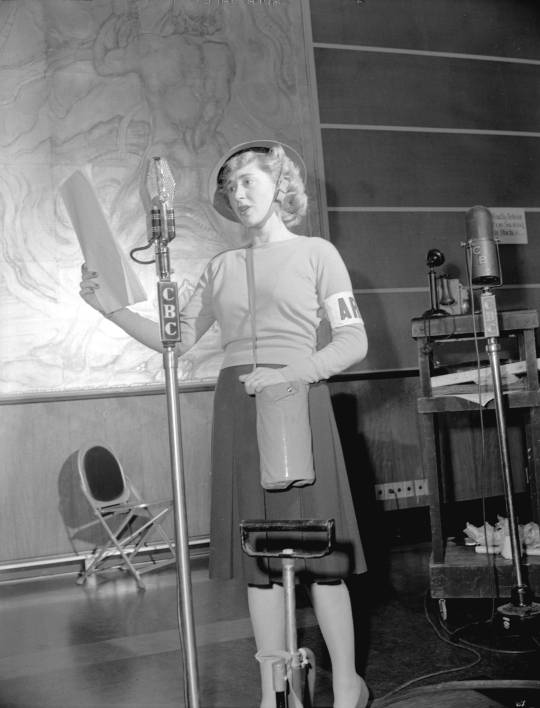
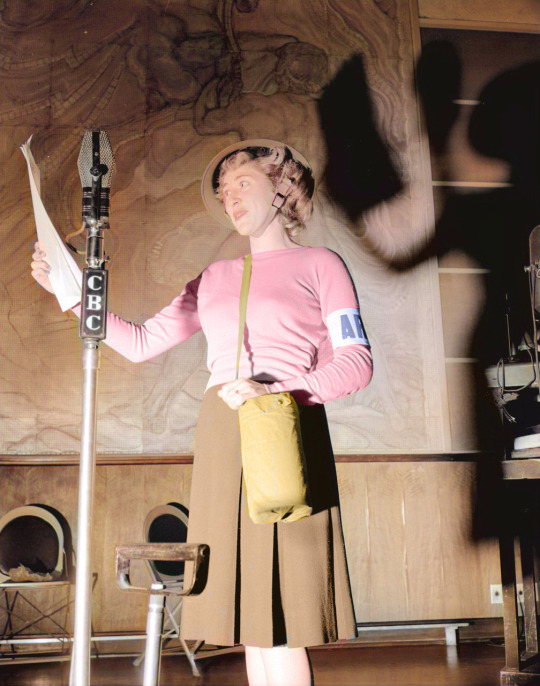
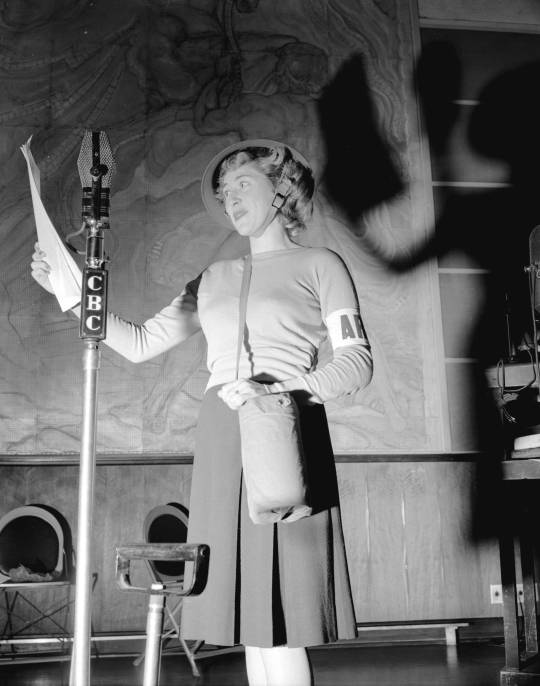

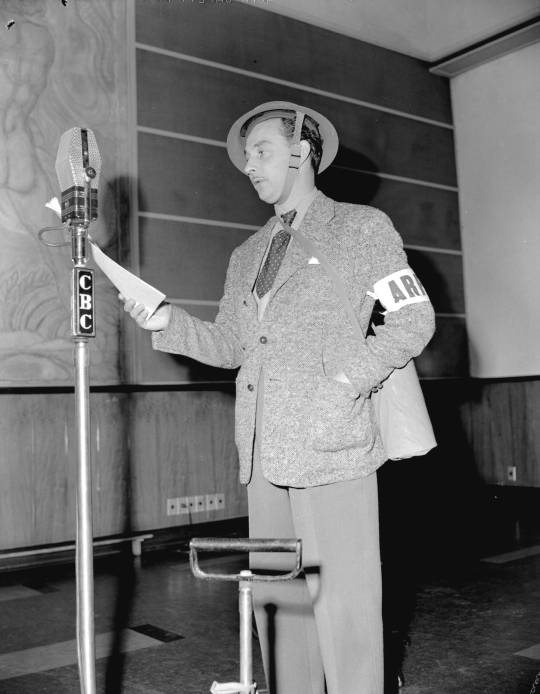

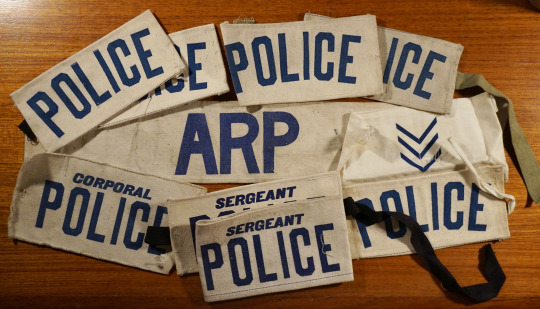
CVA 586-1067 to 1072, somewhat hastily colourized, with some AI assistance. The photos feature an A.R.P. broadcast at a CBC recording studio during WWII. CBC Radio CBU had a studio at the Hotel Vancouver in the war years, I was originally unsure if this would have been at the hotel or elsewhere, but I’ve come to learn these photos were indeed taken at the Hotel Vancouver. CBC Television CBUT moved into 1200 W Georgia Street, a former car dealership building, but that was in 1953; the location was vacant in 1952. The West Georgia location was apparently used exclusively for the Television Station. The artwork in the background of these photos is a bit of a mystery, if it was created especially for the Hotel Vancouver, or if it was something the CBC brought in or commissioned, I have no idea.
Also below, a series of original WWII armbands fro the collection of George William Trayton Bush, who was a CPR man, a WWI vet, and appointed an Auxiliary Policeman during WWII as A.R.P. warden for Kitsilano. A number of these armbands are now in the Vancouver Police Museum. The lettering of these armbands varied, sometimes very dark blue, almost black, to a more royal blue, perhaps depending who made them.
5 notes
·
View notes
Photo

Fakes (prod. David Turko).
Starring local actors Emilija Baranac and Jennifer Tong and explicitly set in the suburbs of West Vancouver, the CBC/Netflix co-production is a real treat to watch. Revolving around the premise of a pair of high school best friends starting a fake ID empire on a whim, episodes find them getting deeper and deeper into trouble in mostly comical fashion.
What’s most remarkable about the generally lighthearted fun had is the sense of actual stakes when the mid-level but still serious criminal elements start to build. Furthermore, both lead characters have key family and personal details that flesh out their ill-advised motivations and taste for danger. Fakes remains surprisingly sophisticated while maintaining a breezy sense of situational comedy.
#fakes#cbc#cbc gem#netflix#streaming#tv review#reviews#feature#features#vancouver#west van#west vancouver#david turko#jennifer tong#emilija baranac#richard harmon#tv#television#tv show#tv series#series#show#netflix original#netflix original series#comedy
8 notes
·
View notes
Link
Charges laid against the protesters are starting to collapse.
#Vancouver Island#arrests#charges#logging company#protesters#assembled#old growth#trees#police#injunction#case#BC#Canada#news#via Politicoast#CBC#world news
0 notes
Text
Hockey Videos: Video: CBC Sports: NHL 1982-Stanley Cup Finals-Game 4-Long Island Islanders @ Vancouver Canucks: Highlights
The Daily Journal The NHL and NBA are the only leagues where you’ll see a great team with a great record, great talent and coaching, versus a team that just barely made the playoffs and play each other in the league championship. And made the playoffs with a losing record and made the playoffs basically because more than half of the teams in each conference make the playoffs. The 1982 Islanders,…
View On WordPress
#1982 New York Islanders#1982 NHL Season#1982 Stanley Cup Finals#1982 Vancouver Canucks#CBC Sports#National Hockey League#New York Islanders#NHL on CBC#Vancouver Canucks
0 notes
Text
Long considered extinct, pentl'ach has now been declared a living language and added to British Columbia's official list of First Nations languages. The reclassification of pentl'ach (pronounced "PUNT-lutch") was the result of both linguistic and administrative work by the Qualicum First Nation on Vancouver Island's east coast, with support from the First Peoples' Cultural Council. The Coast Salish language had been considered extinct because the last well known fluent speaker died in the 1940s. But Mathew Andreatta, a Qualicum member and researcher with the pentl'ach revitalization project, said the language was never truly gone. Andreatta called the reclassification "an affirmation of something that we've always known and that we've always felt." He said the move is important because it is healing for his people, but also because it opens more doors to continue revitalizing the language.
Continue Reading.
Tagging: @politicsofcanada
#Indigenous#First Nations#pentl'ach#indigenous languages#cdnpoli#canada#canadian politics#Qualicum First Nation#Vancouver Island#british columbia
2K notes
·
View notes
Text
How to shatter the class solidarity of the ruling class
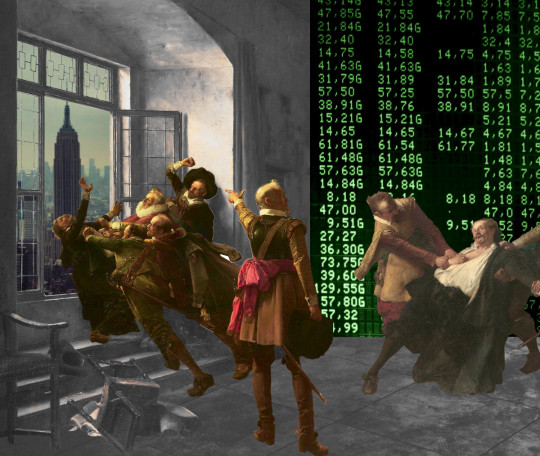
I'm touring my new, nationally bestselling novel The Bezzle! Catch me WEDNESDAY (Apr 11) at UCLA, then Chicago (Apr 17), Torino (Apr 21) Marin County (Apr 27), Winnipeg (May 2), Calgary (May 3), Vancouver (May 4), and beyond!

Audre Lorde counsels us that "The Master's Tools Will Never Dismantle the Master's House," while MLK said "the law cannot make a man love me, but it can restrain him from lynching me." Somewhere between replacing the system and using the system lies a pragmatic – if easily derailed – course.
Lorde is telling us that a rotten system can't be redeemed by using its own chosen reform mechanisms. King's telling us that unless we live, we can't fight – so anything within the system that makes it easier for your comrades to fight on can hasten the end of the system.
Take the problems of journalism. One old model of journalism funding involved wealthy newspaper families profiting handsomely by selling local appliance store owners the right to reach the townspeople who wanted to read sports-scores. These families expressed their patrician love of their town by peeling off some of those profits to pay reporters to sit through municipal council meetings or even travel overseas and get shot at.
In retrospect, this wasn't ever going to be a stable arrangement. It relied on both the inconstant generosity of newspaper barons and the absence of a superior way to show washing-machine ads to people who might want to buy washing machines. Neither of these were good long-term bets. Not only were newspaper barons easily distracted from their sense of patrician duty (especially when their own power was called into question), but there were lots of better ways to connect buyers and sellers lurking in potentia.
All of this was grossly exacerbated by tech monopolies. Tech barons aren't smarter or more evil than newspaper barons, but they have better tools, and so now they take 51 cents out of every ad dollar and 30 cents out of ever subscriber dollar and they refuse to deliver the news to users who explicitly requested it, unless the news company pays them a bribe to "boost" their posts:
https://www.eff.org/deeplinks/2023/04/saving-news-big-tech
The news is important, and people sign up to make, digest, and discuss the news for many non-economic reasons, which means that the news continues to struggle along, despite all the economic impediments and the vulture capitalists and tech monopolists who fight one another for which one will get to take the biggest bite out of the press. We've got outstanding nonprofit news outlets like Propublica, journalist-owned outlets like 404 Media, and crowdfunded reporters like Molly White (and winner-take-all outlets like the New York Times).
But as Hamilton Nolan points out, "that pot of money…is only large enough to produce a small fraction of the journalism that was being produced in past generations":
https://www.hamiltonnolan.com/p/what-will-replace-advertising-revenue
For Nolan, "public funding of journalism is the only way to fix this…If we accept that journalism is not just a business or a form of entertainment but a public good, then funding it with public money makes perfect sense":
https://www.hamiltonnolan.com/p/public-funding-of-journalism-is-the
Having grown up in Canada – under the CBC – and then lived for a quarter of my life in the UK – under the BBC – I am very enthusiastic about Nolan's solution. There are obvious problems with publicly funded journalism, like the politicization of news coverage:
https://www.theguardian.com/media/2023/jan/24/panel-approving-richard-sharp-as-bbc-chair-included-tory-party-donor
And the transformation of the funding into a cheap political football:
https://www.cbc.ca/news/politics/poilievre-defund-cbc-change-law-1.6810434
But the worst version of those problems is still better than the best version of the private-equity-funded model of news production.
But Nolan notes the emergence of a new form of hedge fund news, one that is awfully promising, and also terribly fraught: Hunterbrook Media, an investigative news outlet owned by short-sellers who pay journalists to research and publish damning reports on companies they hold a short position on:
https://hntrbrk.com/
For those of you who are blissfully distant from the machinations of the financial markets, "short selling" is a wager that a company's stock price will go down. A gambler who takes a short position on a company's stock can make a lot of money if the company stumbles or fails altogether (but if the company does well, the short can suffer literally unlimited losses).
Shorts have historically paid analysts to dig into companies and uncover the sins hidden on their balance-sheets, but as Matt Levine points out, journalists work for a fraction of the price of analysts and are at least as good at uncovering dirt as MBAs are:
https://www.bloomberg.com/opinion/articles/2024-04-02/a-hedge-fund-that-s-also-a-newspaper
What's more, shorts who discover dirt on a company still need to convince journalists to publicize their findings and trigger the sell-off that makes their short position pay off. Shorts who own a muckraking journalistic operation can skip this step: they are the journalists.
There's a way in which this is sheer genius. Well-funded shorts who don't care about the news per se can still be motivated into funding freely available, high-quality investigative journalism about corporate malfeasance (notoriously, one of the least attractive forms of journalism for advertisers). They can pay journalists top dollar – even bid against each other for the most talented journalists – and supply them with all the tools they need to ply their trade. A short won't ever try the kind of bullshit the owners of Vice pulled, paying themselves millions while their journalists lose access to Lexisnexis or the PACER database:
https://pluralistic.net/2024/02/24/anti-posse/#when-you-absolutely-positively-dont-give-a-solitary-single-fuck
The shorts whose journalists are best equipped stand to make the most money. What's not to like?
Well, the issue here is whether the ruling class's sense of solidarity is stronger than its greed. The wealthy have historically oscillated between real solidarity (think of the ultrawealthy lobbying to support bipartisan votes for tax cuts and bailouts) and "war of all against all" (as when wealthy colonizers dragged their countries into WWI after the supply of countries to steal ran out).
After all, the reason companies engage in the scams that shorts reveal is that they are profitable. "Behind every great fortune is a great crime," and that's just great. You don't win the game when you get into heaven, you win it when you get into the Forbes Rich List.
Take monopolies: investors like the upside of backing an upstart company that gobbles up some staid industry's margins – Amazon vs publishing, say, or Uber vs taxis. But while there's a lot of upside in that move, there's also a lot of risk: most companies that set out to "disrupt" an industry sink, taking their investors' capital down with them.
Contrast that with monopolies: backing a company that merges with its rivals and buys every small company that might someday grow large is a sure thing. Shriven of "wasteful competition," a company can lower quality, raise prices, capture its regulators, screw its workers and suppliers and laugh all the way to Davos. A big enough company can ignore the complaints of those workers, customers and regulators. They're not just too big to fail. They're not just too big to jail. They're too big to care:
https://pluralistic.net/2024/04/04/teach-me-how-to-shruggie/#kagi
Would-be monopolists are stuck in a high-stakes Prisoner's Dilemma. If they cooperate, they can screw over everyone else and get unimaginably rich. But if one party defects, they can raid the monopolist's margins, short its stock, and snitch to its regulators.
It's true that there's a clear incentive for hedge-fund managers to fund investigative journalism into other hedge-fund managers' portfolio companies. But it would be even more profitable for both of those hedgies to join forces and collude to screw the rest of us over. So long as they mistrust each other, we might see some benefit from that adversarial relationship. But the point of the 0.1% is that there aren't very many of them. The Aspen Institute can rent a hall that will hold an appreciable fraction of that crowd. They buy their private jets and bespoke suits and powdered rhino horn from the same exclusive sellers. Their kids go to the same elite schools. They know each other, and they have every opportunity to get drunk together at a charity ball or a society wedding and cook up a plan to join forces.
This is the problem at the core of "mechanism design" grounded in "rational self-interest." If you try to create a system where people do the right thing because they're selfish assholes, you normalize being a selfish asshole. Eventually, the selfish assholes form a cozy little League of Selfish Assholes and turn on the rest of us.
Appeals to morality don't work on unethical people, but appeals to immorality crowds out ethics. Take the ancient split between "free software" (software that is designed to maximize the freedom of the people who use it) and "open source software" (identical to free software, but promoted as a better way to make robust code through transparency and peer review).
Over the years, open source – an appeal to your own selfish need for better code – triumphed over free software, and its appeal to the ethics of a world of "software freedom." But it turns out that while the difference between "open" and "free" was once mere semantics, it's fully possible to decouple the two. Today, we have lots of "open source": you can see the code that Google, Microsoft, Apple and Facebook uses, and even contribute your labor to it for free. But you can't actually decide how the software you write works, because it all takes a loop through Google, Microsoft, Apple or Facebook's servers, and only those trillion-dollar tech monopolists have the software freedom to determine how those servers work:
https://pluralistic.net/2020/05/04/which-side-are-you-on/#tivoization-and-beyond
That's ruling class solidarity. The Big Tech firms have hidden a myriad of sins beneath their bafflegab and balance-sheets. These (as yet) undiscovered scams constitute a "bezzle," which JK Galbraith defined as "the magic interval when a confidence trickster knows he has the money he has appropriated but the victim does not yet understand that he has lost it."
The purpose of Hunterbrook is to discover and destroy bezzles, hastening the moment of realization that the wealth we all feel in a world of seemingly orderly technology is really an illusion. Hunterbrook certainly has its pick of bezzles to choose from, because we are living in a Golden Age of the Bezzle.
Which is why I titled my new novel The Bezzle. It's a tale of high-tech finance scams, starring my two-fisted forensic accountant Marty Hench, and in this volume, Hench is called upon to unwind a predatory prison-tech scam that victimizes the most vulnerable people in America – our army of prisoners – and their families:
https://us.macmillan.com/books/9781250865878/thebezzle
The scheme I fictionalize in The Bezzle is very real. Prison-tech monopolists like Securus and Viapath bribe prison officials to abolish calls, in-person visits, mail and parcels, then they supply prisoners with "free" tablets where they pay hugely inflated rates to receive mail, speak to their families, and access ebooks, distance education and other electronic media:
https://pluralistic.net/2024/04/02/captive-customers/#guillotine-watch
But a group of activists have cornered these high-tech predators, run them to ground and driven them to the brink of extinction, and they've done it using "the master's tools" – with appeals to regulators and the finance sector itself.
Writing for The Appeal, Dana Floberg and Morgan Duckett describe the campaign they waged with Worth Rises to bankrupt the prison-tech sector:
https://theappeal.org/securus-bankruptcy-prison-telecom-industry/
Here's the headline figure: Securus is $1.8 billion in debt, and it has eight months to find a financier or it will go bust. What's more, all the creditors it might reasonably approach have rejected its overtures, and its bonds have been downrated to junk status. It's a dead duck.
Even better is how this happened. Securus's debt problems started with its acquisition, a leveraged buyout by Platinum Equity, who borrowed heavily against the firm and then looted it with bogus "management fees" that meant that the debt continued to grow, despite Securus's $700m in annual revenue from America's prisoners. Platinum was just the last in a long line of PE companies that loaded up Securus with debt and merged it with its competitors, who were also mortgaged to make profits for other private equity funds.
For years, Securus and Platinum were able to service their debt and roll it over when it came due. But after Worth Rises got NYC to pass a law making jail calls free, creditors started to back away from Securus. It's one thing for Securus to charge $18 for a local call from a prison when it's splitting the money with the city jail system. But when that $18 needs to be paid by the city, they're going to demand much lower prices. To make things worse for Securus, prison reformers got similar laws passed in San Francisco and in Connecticut.
Securus tried to outrun its problems by gobbling up one of its major rivals, Icsolutions, but Worth Rises and its coalition convinced regulators at the FCC to block the merger. Securus abandoned the deal:
https://worthrises.org/blogpost/securusmerger
Then, Worth Rises targeted Platinum Equity, going after the pension funds and other investors whose capital Platinum used to keep Securus going. The massive negative press campaign led to eight-figure disinvestments:
https://www.latimes.com/business/story/2019-09-05/la-fi-tom-gores-securus-prison-phone-mass-incarceration
Now, Securus's debt became "distressed," trading at $0.47 on the dollar. A brief, covid-fueled reprieve gave Securus a temporary lifeline, as prisoners' families were barred from in-person visits and had to pay Securus's rates to talk to their incarcerated loved ones. But after lockdown, Securus's troubles picked up right where they left off.
They targeted Platinum's founder, Tom Gores, who papered over his bloody fortune by styling himself as a philanthropist and sports-team owner. After a campaign by Worth Rises and Color of Change, Gores was kicked off the Los Angeles County Museum of Art board. When Gores tried to flip Securus to a SPAC – the same scam Trump pulled with Truth Social – the negative publicity about Securus's unsound morals and financials killed the deal:
https://twitter.com/WorthRises/status/1578034977828384769
Meanwhile, more states and cities are making prisoners' communications free, further worsening Securus's finances:
https://pluralistic.net/2024/02/14/minnesota-nice/#shitty-technology-adoption-curve
Congress passed the Martha Wright-Reed Just and Reasonable Communications Act, giving the FCC the power to regulate the price of federal prisoners' communications. Securus's debt prices tumbled further:
https://www.govtrack.us/congress/bills/117/s1541
Securus's debts were coming due: it owes $1.3b in 2024, and hundreds of millions more in 2025. Platinum has promised a $400m cash infusion, but that didn't sway S&P Global, a bond-rating agency that re-rated Securus's bonds as "CCC" (compare with "AAA"). Moody's concurred. Now, Securus is stuck selling junk-bonds:
https://www.govtrack.us/congress/bills/117/s1541
The company's creditors have given Securus an eight-month runway to find a new lender before they force it into bankruptcy. The company's debt is trading at $0.08 on the dollar.
Securus's major competitor is Viapath (prison tech is a duopoly). Viapath is also debt-burdened and desperate, thanks to a parallel campaign by Worth Rises, and has tried all of Securus's tricks, and failed:
https://pestakeholder.org/news/american-securities-fails-to-sell-prison-telecom-company-viapath/
Viapath's debts are due next year, and if Securus tanks, no one in their right mind will give Viapath a dime. They're the walking dead.
Worth Rise's brilliant guerrilla warfare against prison-tech and its private equity backers are a master class in using the master's tools to dismantle the master's house. The finance sector isn't a friend of justice or working people, but sometimes it can be used tactically against financialization itself. To paraphrase MLK, "finance can't make a corporation love you, but it can stop a corporation from destroying you."
Yes, the ruling class finds solidarity at the most unexpected moments, and yes, it's easy for appeals to greed to institutionalize greediness. But whether it's funding unbezzling journalism through short selling, or freeing prisons by brandishing their cooked balance-sheets in the faces of bond-rating agencies, there's a lot of good we can do on the way to dismantling the system.

If you'd like an essay-formatted version of this post to read or share, here's a link to it on pluralistic.net, my surveillance-free, ad-free, tracker-free blog:
https://pluralistic.net/2024/04/08/money-talks/#bullshit-walks

Image: KMJ (modified) https://commons.wikimedia.org/wiki/File:Boerse_01_KMJ.jpg
CC BY-SA 3.0 https://creativecommons.org/licenses/by-sa/3.0/deed.en
#pluralistic#shorts#short sellers#news#private equity#private prisons#securus#prison profiteers#the bezzle#anything that cant go on forever eventually stop#steins law#hamilton nolan#Platinum Equity#American Securities#viapath#global tellink#debt#jpay#worth rises#insurance#spacs#fcc#bond rating#moodys#the appeal#saving the news from big tech#hunterbrook media#journalism
804 notes
·
View notes
Text

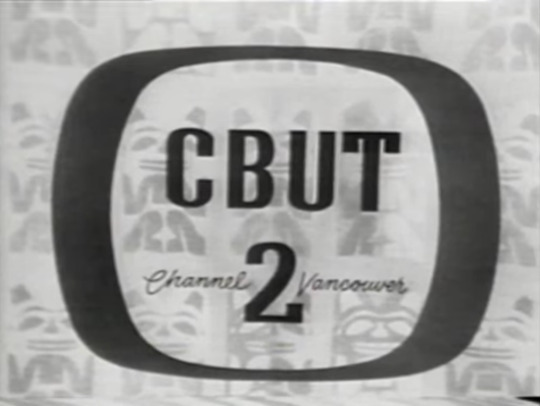
CBUT - Channel 2 - Vancouver
7 notes
·
View notes
Text










Max and Cole in Wild Cards ep 1x04. 🏄🏻♂️ 🍻
#wild cards#max mitchell#cole ellis#max x cole#cole x max#cute#romcom#romance#black woman#wildcards#elilmax#canada#vancouver#cbc#the cw#mystery#vanessa morgan#giacomo gianniotti
26 notes
·
View notes
Text

A now-former president of an LGBTQ organization in Canada was just arrested for committing sex crimes with children, who were all under the age of 16.
But more than just the sex crimes, he was also involved in distributing child pornography.
Here’s the news:
The former president of a northern British Columbia pride organization has been arrested and charged with committing sex crimes against children under 16, according to the B.C. Prosecution Service. The charges against Sean Gravells, 39, include touching a person under 16 for sexual purposes, sexual interference of a person under 16, possession of child pornography, and importing or distributing child pornography, BCPS spokesperson Dan McLaughlin told CBC News in an emailed statement on Monday. The alleged offences all took place in or near Fort St. John, B.C., about 800 kilometres northeast of Vancouver, McLaughlin said. The interference and exploitation charges are for alleged offences on Dec. 29, 2023, while the child pornography charges occurred on Dec. 31, he added. Gravells served as board president for the North Peace Pride Society (NPPS) since 2018, according to a now-deleted biography on the organization’s website, but the NPPS says it recently removed him from the role. In a statement on social media on Friday, NPPS said the board took “swift action” to remove a member who was arrested on Dec. 31 and is now facing “severe charges,” but did not name the member. “In response to the gravity of the charges, we have immediately removed this person from our board, emphasizing our commitment to our community’s values,” the post on NPPS’s Facebook page read. “We want to clarify that the society itself is not implicated in any charges; these are isolated to the individual.”
File This Under: "Things That Don't Surprise Me"
244 notes
·
View notes
Text
Emergency officials say flash floods are "imminent" and could happen within 24 or 48 hours after a landslide blocked the Chilcotin River in British Columbia's Cariboo region.
On Wednesday, the Tŝilhqot'in National Government said a slide of soil and debris blocked the river at Nagwentled, also known as Farwell Canyon, around 285 kilometres north of Vancouver.
"Flooding is building up above the dam created by the landslide, so it's like a lake," Cariboo Regional District chair Margo Wagner said at a virtual news conference Thursday.
"There is a high risk of a flash flood downstream if the river breaches that landslide — which it is expected to do eventually."
Full article
Tagging: @allthecanadianpolitics
#cdnpoli#mine#flooding#flash floods#landslides#Tŝilhqot'in First Nation#Tŝilhqot'in National Government#Chilcotin River#Cariboo region#BC#british columbia
69 notes
·
View notes
Text
youtube
CBC News x "Meet the Young Entrepreneurs Behind the Lee's Donuts Expansion".
Allan Bacani and his wife Celine bought the long-standing Granville Island Public Market doughnut shop in 2017. Its popularity exploded after a Netflix feature with Seth Rogen and chef David Chang. The couple have expanded and modernized but stayed true to the original recipe.
#video#cbc#cbc news#granville island#vancouver#vancity#news#british columbia#lower mainland#donut#donuts#doughnut#dougnuts
0 notes